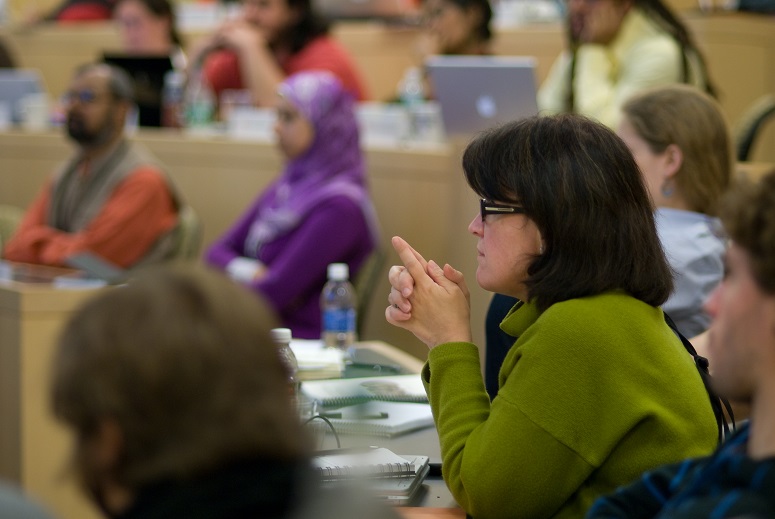U.K.: Solidarity with Europe as 100,000 march on parliament
Venezuela: Ranks of political prisoners grow as democracy ebbs
Hungary: Thousands march in support of university in Budapest
Transforming Women through Civil Resistance and Nonviolent Activism
This “Voices from the Field” webinar occurred on Wednesday, May 10 from 10-11:30 a.m. EST.
Webinar summary:
This interactive panel will discuss women’s movements fighting for better livelihoods, ending violence against women, and supporting inclusion and rights in India. Participants will learn about current majority-women campaigns and movements in West Bengal and Bhopal involving thousands. Discussants will share insightful observations about the challenges of being a solidarity bridge-builder between grassroots movements and global support networks, as well as about the types of tactics and strategic impact that women have on movements, including their leadership and planning.
Presenters:
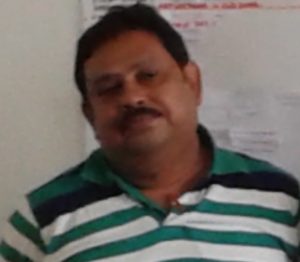 Arnab Chakraborty works at a national NGO called PRADAN (www.pradan.net) with and for extremely poor women to create robust community organizations to stimulate change in each member who individually feels powerless, each with a deeply limiting sense of self-efficacy. He helps them create an environment of togetherness and oneness, lending support to and reinforcing each other and more easily and readily learn from each other. These women working together creates synergy, a social capital, a social and political space for them to change the distribution of power in society. All these involves “enabling” women to take charge of their life around the economic and socio-political realm. This is to ensure that each poor woman is supported to develop livelihood options enhancing her control over economic resources; effectively participates in local governance systems and builds gender-sensitive accountability processes; negotiates intra-family issues that hinder equal access to rights for women and girls, including addressing domestic violence and access rights and entitlements enshrined in the Constitution. Arnab is also a 2016 LIN Fellowship member and received a small grant to develop and implement training on nonviolent action and resistance to Adhivasi women in West Bengal. The grant supported several TOT workshops and training and action plans distributed to many thousands of women who began their public nonviolent resistance in March 8 on International Women’s Day.
Arnab Chakraborty works at a national NGO called PRADAN (www.pradan.net) with and for extremely poor women to create robust community organizations to stimulate change in each member who individually feels powerless, each with a deeply limiting sense of self-efficacy. He helps them create an environment of togetherness and oneness, lending support to and reinforcing each other and more easily and readily learn from each other. These women working together creates synergy, a social capital, a social and political space for them to change the distribution of power in society. All these involves “enabling” women to take charge of their life around the economic and socio-political realm. This is to ensure that each poor woman is supported to develop livelihood options enhancing her control over economic resources; effectively participates in local governance systems and builds gender-sensitive accountability processes; negotiates intra-family issues that hinder equal access to rights for women and girls, including addressing domestic violence and access rights and entitlements enshrined in the Constitution. Arnab is also a 2016 LIN Fellowship member and received a small grant to develop and implement training on nonviolent action and resistance to Adhivasi women in West Bengal. The grant supported several TOT workshops and training and action plans distributed to many thousands of women who began their public nonviolent resistance in March 8 on International Women’s Day.
 Reena Shadaan is a doctoral candidate in the Faculty of Environmental Studies at York University (Toronto, Canada). Her work explores gender and environmental racism, environmental health, and reproductive justice. Since 2013, she has been Coordinating Committee member of the North American solidarity tier of the International Campaign for Justice in Bhopal (ICJB) – an environmental justice and corporate accountability campaign that is led by survivors of the 1984 Bhopal gas disaster, and seeks justice for the ongoing disaster in Bhopal, India.
Reena Shadaan is a doctoral candidate in the Faculty of Environmental Studies at York University (Toronto, Canada). Her work explores gender and environmental racism, environmental health, and reproductive justice. Since 2013, she has been Coordinating Committee member of the North American solidarity tier of the International Campaign for Justice in Bhopal (ICJB) – an environmental justice and corporate accountability campaign that is led by survivors of the 1984 Bhopal gas disaster, and seeks justice for the ongoing disaster in Bhopal, India.
Struggling for Livelihood, Dignity, and Free and Fair Elections in Africa: Spotlight on Kenya
This “Voices from the Field” webinar is scheduled for Thursday, October 5 from 10am to 11:30am ET.
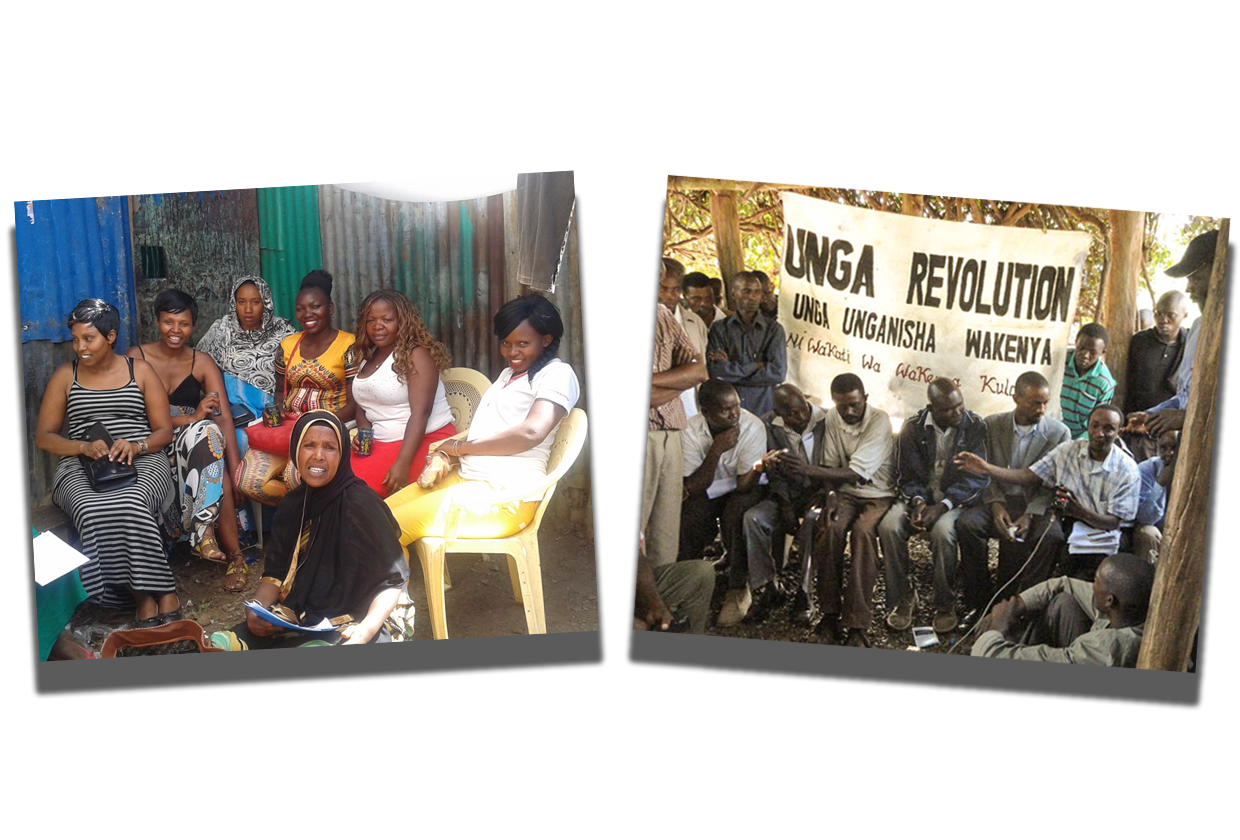 Webinar summary:
Webinar summary:
With the recent presidential elections nullified by the Supreme Court, Kenyans are struggling for free, fair and verifiable elections. Without these, the risk of violence rises. This webinar will focus on grassroots coalitions like Kenyans for Tax Justice that are using strategic nonviolent action for a variety of goals: to ensure free elections; to end extra-judicial killings and violence against women and youth; and to achieve basic human rights enshrined in the Kenyan constitution but not realized for most of the country’s population. Many citizens in countries around the world, including democracies and those with more authoritarian governments, are grappling with the same challenges. The webinar will offer practical strategies, insights, and lessons learned that are relevant for activists and organizers struggling for justice in Africa and around the world.
Click here to register
Presenters:
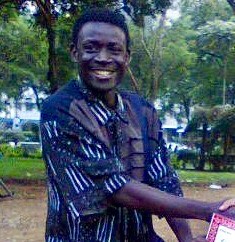 Julius Okoth is a social justice crusader and currently coordinator of Kenyans for Tax Justice movement. He believes in social inclusion, respect for human rights and effective participation of all citizens in democratic and development processes and in governance of public affairs. Together with his fellow citizens at the grassroots, he has been advocating for a system of Kenya’s government that is representative, by demanding national or county government to do something or stop them doing something for the sake of fair, just and equitable Kenyan society directed towards fruitful relationship among human beings and between humans and the Earth.
Julius Okoth is a social justice crusader and currently coordinator of Kenyans for Tax Justice movement. He believes in social inclusion, respect for human rights and effective participation of all citizens in democratic and development processes and in governance of public affairs. Together with his fellow citizens at the grassroots, he has been advocating for a system of Kenya’s government that is representative, by demanding national or county government to do something or stop them doing something for the sake of fair, just and equitable Kenyan society directed towards fruitful relationship among human beings and between humans and the Earth.
Julius and Kenyans for Tax Justice received a LIN 2016 Fellowship and have successfully developed a number of trainers and experts on nonviolent resistance that are spreading the knowledge throughout Kenya in preparation for the August 2017 elections. They are seeking to work with communities and interested parties to oppose the Value Added Tax (VAT) that has recently been imposed on school textbooks, a move which has hit the poorest of the poor school-going children the hardest. The project will work with communities to ensure that these new taxes are abolished, and education is made accessible to all – using nonviolent means of resistance.
It is instructive to note that in Africa, only Kenya and South Africa levy Value Added Tax on school textbooks. This has made books very expensive, considering that majority of Kenyans live below the poverty line. This effort seeks to ensure that books are affordable, and education is accessible to all. They also work on broader rights related to basic needs, violence against women, and human rights.
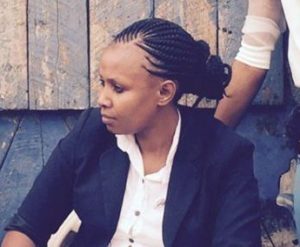 Ruth Mumbi is a social justice activist, a community organiser and a strong defender of human/women’s rights. She was born and brought up in the informal settlement of Mathare, which is a collection of slums, and the second largest informal settlement in Nairobi, the capital city of Kenya. Ruth is the founder and current National Coordinator of Bunge la Wamama, a women’s chapter of Bunge la Mwananchi, a movement that conducts strong advocacy and campaigning on issues of social justice and accountability in different parts of Kenya.
Ruth Mumbi is a social justice activist, a community organiser and a strong defender of human/women’s rights. She was born and brought up in the informal settlement of Mathare, which is a collection of slums, and the second largest informal settlement in Nairobi, the capital city of Kenya. Ruth is the founder and current National Coordinator of Bunge la Wamama, a women’s chapter of Bunge la Mwananchi, a movement that conducts strong advocacy and campaigning on issues of social justice and accountability in different parts of Kenya.
Bunge la Wamama is also a member of the Kenyans for Tax Justice Coalition. Ruth Mumbi was a finalist for the 2013 Front Line Award for Human Rights Defenders at Risk and is a recognized women human rights defender in Kenya that works with grassroots communities. She facilitates community dialogue on social justice issues by empowering my community with knowledge, mobilizing them to expose malpractices by state officers, condemn human rights violations and demand accountability from the government.
Ruth also guides the women in the informal settlements on how to make demands on state agencies, including demands for the arrest of persons who have committed sexual and gender based violence (SGBV) and where police failed to act; and demand justice for the victims and accountability from the police, by linking up victims of SGBV to human rights organisations where they can be offered free legal representation in court. Ruth attended the Centre for Applied Human Rights at the University of York, UK in 2014. Her position as a community leader has led to harassment, attacks, and ongoing threats.
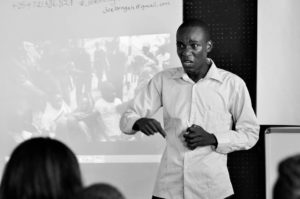 Sakwa Makanda is a social justice activist in Kenya and a leader in the Kenyans for Tax Justice western chapter. His responsibilities include training and capacity building for residents who are mostly peasant farmers, boda boda drivers, and community leaders involved in building nonviolent social movements. In the past, he has been involved in building the unga revolution, a nonviolent campaign advocating for the reduction of prices for basic foodstuffs (unga is a staple of the local population’s diet); occupation of the Kenyan parliament fighting for the reduction of MPs’ salaries; and organizing the Bunga La Mwanchi (an umbrella coalition of a nonviolent movement), and Kenyans for Tax Justice chapters across the country. The goals of these mobilizations are freedom of association and speech. In the course of these struggles, many activists have been arrested, including Sakwa who has appeared in court five times on trumped up charges.
Sakwa Makanda is a social justice activist in Kenya and a leader in the Kenyans for Tax Justice western chapter. His responsibilities include training and capacity building for residents who are mostly peasant farmers, boda boda drivers, and community leaders involved in building nonviolent social movements. In the past, he has been involved in building the unga revolution, a nonviolent campaign advocating for the reduction of prices for basic foodstuffs (unga is a staple of the local population’s diet); occupation of the Kenyan parliament fighting for the reduction of MPs’ salaries; and organizing the Bunga La Mwanchi (an umbrella coalition of a nonviolent movement), and Kenyans for Tax Justice chapters across the country. The goals of these mobilizations are freedom of association and speech. In the course of these struggles, many activists have been arrested, including Sakwa who has appeared in court five times on trumped up charges.
Curriculum Fellowships for Online Courses
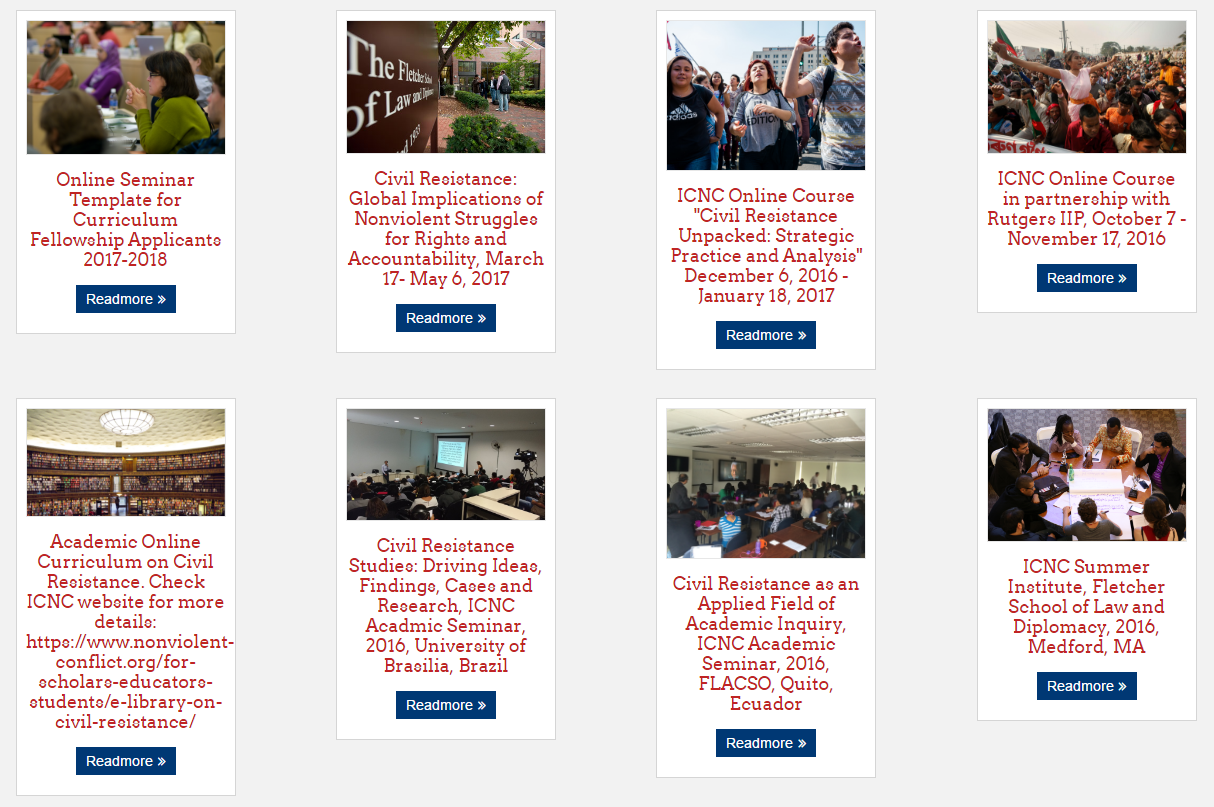 Applicants interested in developing and teaching online seminars
Applicants interested in developing and teaching online seminars
ICNC is strongly interested in supporting the expansion of online teaching on civil resistance, particularly in situations where it is difficult or impossible to develop a formal classroom-based course at a local academic institution. In such cases, ICNC Curriculum Fellowships aims to encourage and support interested instructors to set up an online seminar on civil resistance and offer it to a select group of interested learners.
Interested also in teaching classroom-based courses? Check this curriculum fellowship for classroom-based courses.
Online seminar consists of a minimum of 5 weekly sessions on civil resistance where participants are asked to review relevant session notes, videos, and readings and then engage in forum discussions moderated by a seminar instructor.
The curriculum fellowship is designed to plant a seed for continued education on civil resistance. Applicants should therefore be able to demonstrate that their curriculum is part of a long-term, sustainable teaching plan, as opposed to being a one-off course offering.
Application deadline: April 30, 2017.
Click the links to learn more:
- Eligibility
- Award
- Fellowship Components
- Recommended Resources
- How to Apply
- Fellowship Distribution
- Past Curriculum Fellows
Eligibility
- Scholars, and instructors from colleges and universities around the world who are interested in expanding their institutions’ existing curriculum to cover civil resistance.
- Educators and trainers who might be loosely affiliated with academic institutions at home or abroad but have academic-based training or pedagogical and teaching experience, particularly in regions and countries with restrictive civic spaces or conflicts.
Award Details
In 2017, up to seven curriculum fellowships, each in the amount of $1,300, will be offered on open, merit and competitive bases to qualified applicants to develop:
- an online seminar on civil resistance that will be offered to students and interested learners from applicant’s university, town, district, country or the region. The online seminar would be given through the designated ICNC’s online platform.
In addition to a curriculum fellowship grant, awardees will receive a package with academic books and documentaries on civil resistance. ICNC provides these resources free of charge as part of its curriculum fellowship package to help its fellows develop the content on and teach civil resistance.
Teaching for 2017/2018 ICNC Curriculum Fellowships is expected to take place either in Summer, Fall 2017 or Winter, Spring 2018.
As part of the fellowship it is expected that:
a. Perspective applicant will access and review the Curriculum Fellowship Template for an Online Seminar [enrollment key: Onlinetemplate2017]. Once selected, fellow will be expected to develop a similar online seminar, though customized to fit their own teaching environment, learning objectives and audience.
b. Limited technical assistance from ICNC will be available to help fellows learn basic ICNC Moodle or Open edX functionality to be able to build their own courses.
c. fellow is expected to develop original content for and run an online seminar
d. proposal for the online seminar will, at minimum, include teachable content (such as audio/videos, readings, exercises, forum discussions) on:
- what civil resistance is, including prevailing misconceptions
- historical record and effectiveness of civil resistance
- strategies and tactics of civil resistance
- dynamics of civil resistance including but not limited to the phenomenon of backfire, defections, movement mobilization, sustainability and/or tactical innovation and sequencing
e. fellow moderates the course online in its different forums where learners comment on the materials reviewed and exchange ideas about specific topics and respond to moderator’s questions.
f. fellow interacts with learners via regular, live video-conferencing and creative online content (e.g. case studies/exercises) to ensure learners’ active engagement and to reduce attrition from the online course once it begins
g. no less than 10 and no more than 20 students per fellow are actively engaged throughout the online seminar to ensure effective course moderation and supervision
h. materials on civil resistance that a fellow selects, develops and uploads into online seminar can be in language other than English (check recommended resources) though the initial curriculum proposal for ICNC consideration must be in English
i. forum conversations and moderation can be conducted in a language other than English
j. fellow prepares and shares with ICNC bi-weekly English-language reports on the progress of the online seminar, including participants’ interactions in discussion forums and their work on seminar assignments
k. fellow is encouraged to arrange an online guest speaker who will present on a selected topic on civil resistance
l. fellow develops online evaluation instrument to be used to assess progress in students’ learning about civil resistance
- template of a pre-seminar learning gains survey (distributed prior to the start of the seminar)
- template of a post-seminar learning gains survey (distributed at the end of the seminar)
m. fellow develops online final course evaluation to solicit students’ feedback on the course content on civil resistance
Review:
- template of a final course evaluation
n. fellow submits a final report to ICNC soon after the course or curriculum unit ends. The report will summarize content on civil resistance delivered, including any innovative teaching tools used, completed assignments, aggregate results from the students’ learning gains surveys, results from the final evaluation and general lessons learnt
How to Apply
To be considered applicants should review ICNC recommended list of resources, fill out the online application form, submit CV and curriculum proposal, and other information as requested.
APPLY for the Online Seminar Fellowship
The curriculum proposal should include a detailed description of the content for at least five weekly-based online sessions on civil resistance where participants are asked to review a relevant session description, videos, and readings and engage in forum discussions moderated by a seminar instructor. Once the applicant is selected and becomes familiar with the ICNC online learning management system, s/he will set up the proposed curriculum (with any requested modifications) on the designed space in the ICNC online learning platform.
Application deadline: April 30, 2017 for online courses that will be offered in Summer or Fall 2017 or Winter and Spring 2018.
Recommended List of Resources for Curriculum Proposal Development
In developing the curriculum proposal on civil resistance for either a classroom-based course or online seminar, applicants are strongly encouraged to review the ICNC universal e-classroom for ideas on curriculum content as well as sample syllabi. In addition, applicants may wish to consider integrating into the sessions on civil resistance the following resources:
- ICNC translations: if a proposed course is taught in a language different than English, a fellow will be expected to incorporate translations of civil resistance literature available in the ICNC library, which houses materials on civil resistance in 55 languages.
- A Force More Powerful, 2000 documentary
- Bringing Down a Dictator, 2001 documentary
- Orange Revolution, 2007 documentary
- Erica Chenoweth and Maria Stephan, Why Civil Resistance Works. The Strategic Logic of Nonviolent Conflict (New York: Columbia University Press, 2011)
- Maciej Bartkowski, ed. Recovering Nonviolent History. Civil Resistance in Liberation Struggles (Boulder, CO: Lynne Rienner Publishers, 2013)
- Peter Ackerman, and Jack DuVall, A Force More Powerful: A Century of Nonviolent Conflict (New York: Macmillan, 2000)
- Shaazka Beyerle, Curtailing Corruption. People Power for Accountability and Justice (Boulder, CO: Lynne Rienner Publishers, 2014)
- Veronique Dudouet, ed. Civil Resistance and Conflict Transformation. Transition from Armed to Nonviolent Struggle (London: Routledge, 2015)
- A Diplomat’s Handbook for Democracy Development Support
Check also Selected Bibliography on Civil Resistance (2016)
Applicants’ curriculum proposal – to be submitted as part of the application process – is expected to include a list of resources on civil resistance that an applicant plans to incorporate into an online seminar and is encouraged to identify a potential guest speaker suitable for a proposed civil resistance topic.
Fellowship Distribution
The fellowship grants will be disbursed in two equal installments. The first installment will be made after the course begins, the student enrollment is confirmed and the syllabus with an online civil resistance content has been satisfactorily reviewed by ICNC. The second installment will be made after the online seminar ends and ICNC receives fellow’s final report and results of students’ evaluations pertaining to their learning on civil resistance and course assessment.
Past Curriculum Fellows
2016 Curriculum Fellows
2015 Curriculum Fellows
2014 Curriculum Fellows
Curriculum Fellowships for Classroom-based Courses
Applicants interested in developing and teaching classroom-based courses
ICNC is interested in promoting teaching of civil resistance in academic institutions that have not yet developed coursework on the subject. We especially encourage applications from candidates who do not currently teach civil resistance at the institutions where they want to develop the new curriculum unit. We also prefer that the institutions have at present no courses on civil resistance offered as part of the departmental, school, or university curriculum.
Interested also in teaching online seminars? Check the curriculum fellowship for online courses.
Applicants are expected to develop a curriculum unit on civil resistance that, at minimum, covers five 90-minute sessions over the course of minimum of 5 weeks as part of the undergraduate or graduate course and consists of either instructor guides, readings, modules, exercises, or simulations directly relevant to the field of civil resistance.
The curriculum fellowship is designed to plant a seed for continued education on civil resistance. Applicants should therefore be able to demonstrate that their curriculum is part of a long-term, sustainable teaching plan, as opposed to being a one-off course offering.
Application deadline: April 30, 2017.
Click the links to learn more:
- Eligibility
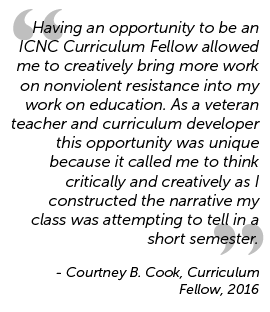
- Award
- Fellowship Components
- How to Apply
- Recommended Resources
- Fellowship Distribution
- Past Curriculum Fellows
Eligibility
- Scholars, and instructors from colleges and universities around the world who are interested in expanding their institutions’ existing curriculum to cover civil resistance.
- Educators and trainers who might be loosely affiliated with academic institutions at home or abroad but have academic-based training or pedagogical and teaching experience, particularly in regions and countries with restrictive civic spaces or conflicts.
Award Details
In 2017, up to seven curriculum fellowships, each in the amount of $1,300, will be offered on open, merit and competitive bases to qualified applicants to develop:
- a curriculum unit on civil resistance that will be offered as a self-standing, elective or mandatory, course at the applicant’s home university
or
- a curriculum unit on civil resistance that will be incorporated into the existing, elective or mandatory, course at the applicant’s home university
In addition to a curriculum fellowship grant, awardees will receive a package with academic books and documentaries on civil resistance. ICNC provides these resources free of charge as part of its curriculum fellowship package to help its fellows develop the content on and teach civil resistance.
Teaching for 2017/2018 ICNC Curriculum Fellowships is expected to take place either in Summer, Fall 2017 or Winter, Spring 2018.
As part of the fellowship it is expected that:
a. fellow develops a full-fledged course syllabus that includes a curriculum unit on civil resistance. A unit on civil resistance covers minimum five 90-minute sessions over the period of minimum of 5 weeks.
b. sessions on civil resistance that are part of the developed curriculum unit will, at minimum, analyze and explain to students:
- what civil resistance is, prevailing misconceptions
- historical record and effectiveness of civil resistance
- strategies and tactics of civil resistance
- dynamics of civil resistance including but not limited to the phenomenon of backfire, defections, movement mobilization, sustainability or tactical innovation and sequencing
c. no less than 10 students will register and attend the course
d. course syllabus, assignments and assessment materials are to be developed in English, though the course itself can be conducted in a different language
e. fellow hosts at least one guest speaker that will present on a selected topic on civil resistance
f. fellow develops online evaluation instrument to be used to assess progress in students’ learning about civil resistance
- template of a pre-seminar learning gains survey (distributed prior to the start of the seminar)
- template of a post-seminar learning gains survey (distributed at the end of the seminar)
g. fellow develops online final course evaluation to solicit students’ feedback on the course content on civil resistance
Review:
- template of the final course evaluation
h. fellow submits a final report to ICNC soon after the course or curriculum unit ends. The report will summarize content on civil resistance delivered, including any innovative teaching tools used, information on the guest speaker talk, aggregate results from the students’ learning gains surveys, results from the final evaluation and general lessons learnt
i. students’ feedback/evaluation and recommendation for improvements
j. fellow selects and submits to ICNC- with students permission –one/two outstanding pieces of written or audio/video work on civil resistance done as part of the course
To be considered applicants should review ICNC recommended list of resources, fill out the online application form, submit CV and curriculum proposal, and other information as requested.
How to Apply
To be considered applicants should fill out the online application form, submit their CV and curriculum proposal, and other information as requested.
APPLY for the Classroom-Based Fellowship
The curriculum proposal should include a detailed description of the content of at least five 90-minute sessions that will be taught for a minimum of 5 weeks. Each proposed session must include a brief description of the topic covered, as well as a list of assigned readings on civil resistance. If applicable, the applicant should also attach a revised syllabus that will include the newly proposed sessions on civil resistance and explain how these new topics relate to the existing course material. Finally, the application will identify the course number, its elective or mandatory status, departmental/institutional affiliation for the course, average number of enrolled students, and the semester when it will be offered.
Application deadline: April 30, 2017 for courses that will be offered in Summer, Fall 2017 or Winter, Spring 2018
Recommended List of Resources for Curriculum Proposal Development
In developing the curriculum proposal on civil resistance for a classroom-based course, applicants are strongly encouraged to review the ICNC universal e-classroom for ideas on curriculum content as well as sample syllabi. In addition, applicants may wish to consider integrating into the sessions on civil resistance the following resources:
- ICNC translations: if a proposed course is taught in a language different than English, a fellow will be expected to incorporate translations of civil resistance literature available in the ICNC library, which houses materials on civil resistance in 55 languages
- A Force More Powerful, 2000 documentary
- Bringing Down a Dictator, 2001 documentary
- Orange Revolution, 2007 documentary
- Erica Chenoweth and Maria Stephan, Why Civil Resistance Works. The Strategic Logic of Nonviolent Conflict (New York: Columbia University Press, 2011)
- Maciej Bartkowski, ed. Recovering Nonviolent History. Civil Resistance in Liberation Struggles (Boulder, CO: Lynne Rienner Publishers, 2013)
- Peter Ackerman, and Jack DuVall, A Force More Powerful: A Century of Nonviolent Conflict (New York: Macmillan, 2000)
- Shaazka Beyerle, Curtailing Corruption. People Power for Accountability and Justice (Boulder, CO: Lynne Rienner Publishers, 2014)
- Veronique Dudouet, ed. Civil Resistance and Conflict Transformation. Transition from Armed to Nonviolent Struggle (London: Routledge, 2015)
- A Diplomat’s Handbook for Democracy Development Support
Check also Selected Bibliography on Civil Resistance (2016)
Applicants’ curriculum proposal – to be submitted as part of the application process – is expected to include a list of resources on civil resistance that an applicant plans to incorporate into a classroom-based and identify a potential guest speaker suitable for a proposed civil resistance topic.
Fellowship Distribution
The fellowship grants will be disbursed in two equal installments. The first installment will be made after the course begins, the student enrollment is confirmed and the syllabus with a civil resistance component has been satisfactorily reviewed by ICNC. The second installment will be made after the classroom-based course ends and ICNC receives fellow’s final report and results of students’ evaluations pertaining to their learning on civil resistance and course assessment.
Past Curriculum Fellows
2016 Curriculum Fellows
2015 Curriculum Fellows
2014 Curriculum Fellows
